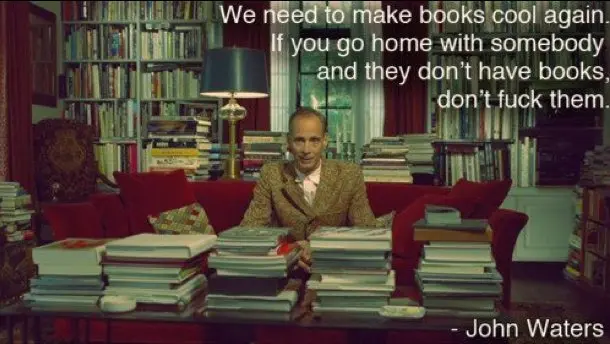Image by Ulysses0302
Last year, the New Yorker ran a piece called Ghosts in the Stacks that I liked simply because it began with the perfect way to talk about our current book fetish:
In the nineteen-nineties, when you bought a book at Barnes & Noble the cashier slipped it into a plastic bag bearing a black-and-white illustration of an author’s face—Mark Twain, Oscar Wilde, Edith Wharton. Recently, I was poking around a bookstore in Manhattan and noticed a canvas tote for sale. In a simple red heart, the word “books” was spelled out in white letters. This tale of two bags is the story of decades of change in the publishing industry. “Books,” O.K.—but which ones?
The number of Americans who read books has been declining for thirty years, and those who do read have become proud of, even a bit overidentified with, the enterprise. Alongside the tote bags you can find T-shirts, magnets, and buttons emblazoned with covers of classic novels; [...] The merchandising of reading has a curiously undifferentiated flavor, as if what you read mattered less than that you read.
On social media, it’s a common sight: self-described obsessive book lovers who share links to videos about the importance of reading, interviews with writers who say that above all it is reading that brings them to life, and this irritating John Waters quote that keeps turning up on my feeds:

Books! Books! I love books and books and la la la la la la. Reading time!
I don’t mean to imply, by my tone here, that I think we ought to worship particular writers and sneeringly dismiss the pleasures of ordinary, undifferentiated, omnivorous reading as a principle (if that even really exists…). But I do think that if we’re going to fetishize books, to turn the concept of loving books into an ideal that transcends individual books, then we’re missing a trick by not being more literal about it. Let’s love books. Let’s actually think of them as a kind of significant other.
I’ve been almost physically in love with books. It happened with William Gaddis’s The Recognitions. You know that friend who gets a partner and suddenly vanishes from your social circle because they spend all their time together? I was like that with The Recognitions. I stopped reading anything else of substance for about six months, and read and reread and absorbed and even dreamed about it sometimes. I’m told this happens to teenage girls reading vampire novels. Well, that wasn’t a love of reading, that was a love of The Recognitions.
So, with only one eyebrow raised in self-ironizing innocence, I offer these valuable tips on how to love a book, instead of loving reading.
Discover where you are, as a human being, through it.
I would have liked to start with the obvious one: Spread the word! If you like the book, somebody else is going to like it too!
But here’s the problem. Maybe you don't want other people to know how good this book is, because it's yours. Why share it? You're not ready for a book threesome; you don’t want everyone to be gushing about this underrated classic. I get like this a lot, and end up doing the opposite of word-of-mouth: I say nothing, tell nobody about this under-appreciated novel I love so much. I don’t want to find out that someone whose opinions I reject automatically for petty reasons has loved the same book I love. There’s a problem of ego here, and the book is trapped in the middle of it.
Ego is everywhere in the reading experience. You can learn far more about yourself than you ever wanted to by examining your reactions to titles, your dismissal of particular genres, your aversion to or irrational love for translated books. I only read books that, in human form, would have been brunettes.
Just as a romantic relationship can, if you’re willing to put in the work, force you to grow up and confront a few demons, a relationship with a book can jolt you out of your precious safety. Maybe — I’m saying maybe — part of the reason you like Gravity’s Rainbow is that most of your friends never made it through to the end. Maybe you won’t read Jane Austen because you assume it’s early chick-lit. These quirks tell you something about yourself. It’s fine, and you don’t have to change, but it’s there.
Share the love in small, sweet ways.
So, okay, you’re clearly not yet psychologically ready to tell everyone how good James Hanley’s Boy is. It’s yours alone. At least leave a thoughtful, enthusiastic, convincing review of this book you love so much on somewhere like Goodreads or Amazon. That way, you could let everybody know that you got the girl, you narcissist.
Dare to change your mind about it.
The things that stood out about the book on a first read — the realistic characters, the sinewy prose — may not be the things you end up appreciating the most later on. You may find yourself disliking what you loved before, just as your boyfriend’s giggling, once so cute, is now seriously off-putting. The author’s tone suddenly seems patronizing instead of endearing. This happens all the time.
But the book doesn’t change; you do. And only a serious familiarity with a book will let you use that book as a mirror. Why was this so funny before? Why did I never notice how cruel this book is to its African characters before? Why was I so attracted to the idea of Heathcliff for those three months...?
It’s a mark of respect for a book that you dare to grow out of it, and end up seeing it for what it is: imperfect, someone’s best attempt at doing something which you then took as your own for a while. When you move on, move on. (“Turn the record over!”)
Books are nothing special. And they are nothing at all without readers.
Commit it to memory.
There was a time when I could recite the opening pages of William Faulkner's Absalom, Absalom! with no trouble — I can still do the opening page. Keats’s "Ode on a Grecian Urn", for some reason the only of his odes I truly like, flows out easily. The first of Ezra Pound's Pisan Cantos. The rules of Fight Club.
Why bother? If you've never actually memorized a poem in full before, then you probably don't know the incredible intimacy that you can build with a text by internalizing it that way. Sometimes — hell, often — you don't know why you like a certain poem or why someone's prose makes you so happy and excited to be alive until you've memorized it all the way through. It forces you to pay attention to every single moment in the text. It makes you more sensitive than ever to rhythm, to the ghostly stirrings in each sentence.
Nowadays you don’t need to know people’s phone numbers by heart, and you definitely don’t need to know whole texts, but for that reason the bond created by knowing it anyway can be surprising.
Learning by heart transforms the text from something that you stare at and consume into something you are doing, that you are carrying around with you all the time, words you're keeping alive inside you. You’ll notice how your body responds to certain phrases. It’s weird. I never knew I liked Faulkner’s over-latinized breathlessness so much until I trusted a feeling in my body and memorized those opening pages. It was only then I learned where to find the rhythms in sentences like this:
From a little after two o’clock until almost sundown of the long still hot weary dead September afternoon they sat in what Miss Coldfield still called the office because her father had called it that — a dim hot airless room with the blinds all closed and fastened for forty-three summers because when she was a girl someone had believed that light and moving air carried heat and that dark was always cooler, and which (as the sun shone fuller and fuller on that side of the house) became latticed with yellow slashes full of dust motes which Quentin thought of as being flecks of the dead old dried paint itself blown inward from the scaling blinds as wind might have blown them.
(Motherf...mmmph... fine. Looks like I can't just consume this book without effort.)
Some readers will simply laugh at the whole idea and move on. Fine. But I challenge you to learn something lengthy by heart. See for yourself what it means to incorporate the text.
If you want a suggestion, learn the first few lines of T.S. Eliot's "The Love Song of J. Alfred Prufrock". Everyone knows them, so it won’t be a pointless exercise in esotericism, but it’s still a challenge.
Touch your book.
Don't just hold it and turn the pages. Touch the damned book all over the place. Bite the top of its spine. Try it. See what happens.
Literally put the top corner of the book between your teeth. Why not?
Get to know the texture of the paper. Press your finger tips against the words on the page, close your eyes and try to feel the ink itself. Notice how the sound of the rustling of pages changes from book to book, sometimes sleepy, sometimes scratchy. Hold up the creased spine to the daylight and look at the creases. Ask yourself: at what point during my reading did I crease the book in this way?
Be grateful that this book exists. Become familiar with the way its weight feels in your hand. This is the physical medium through which you came to love the story it holds. Cherish it.
How do you love your books? Get kinky in the comments.

About the author
Phil Jourdan is a writer, musician and distinctly unenlightened person. He is structural editor at Angry Robot, and a co-founder of Repeater Books and Litreactor. He splits his time between the UK and Argentina.








